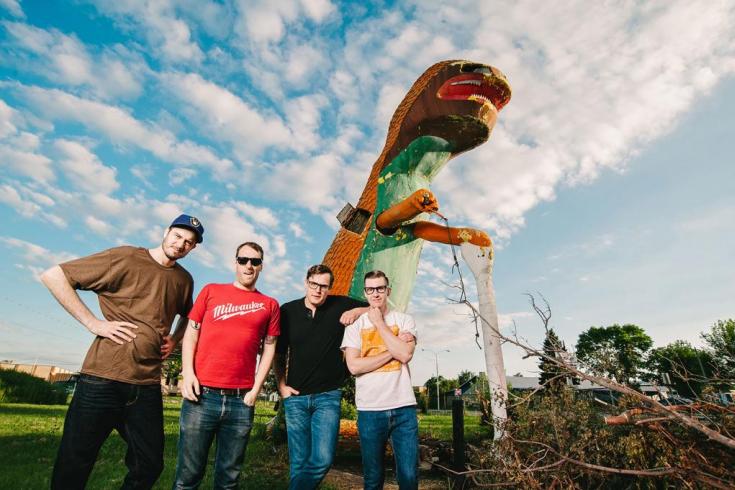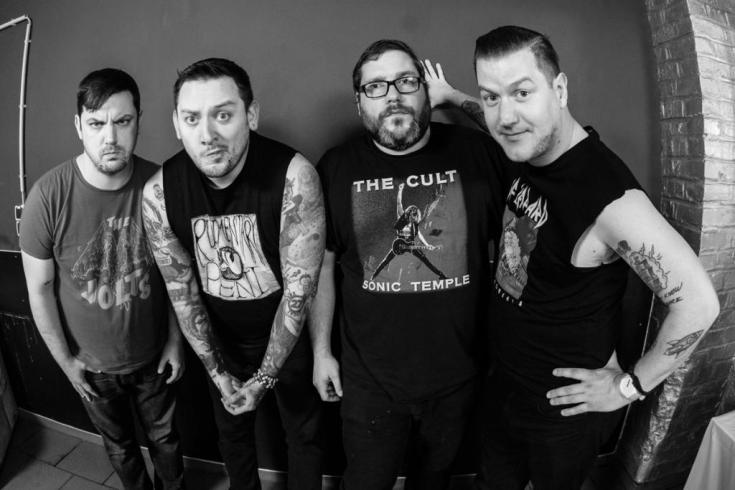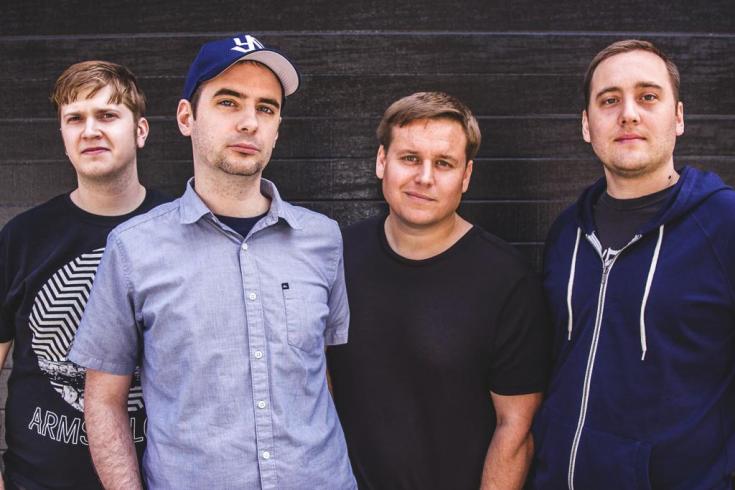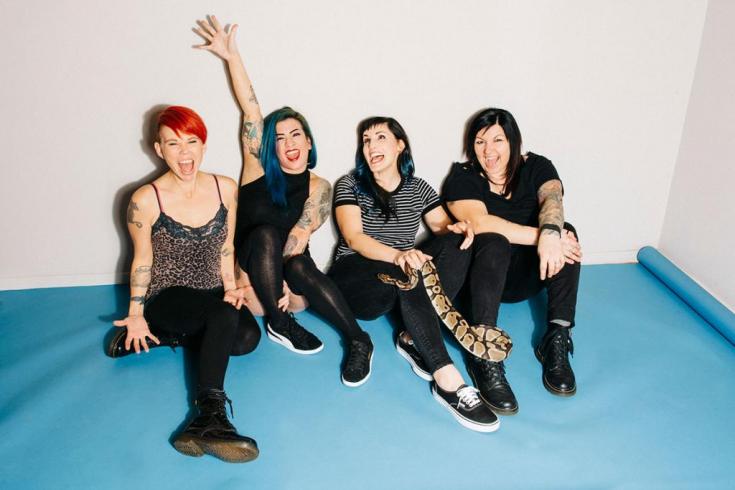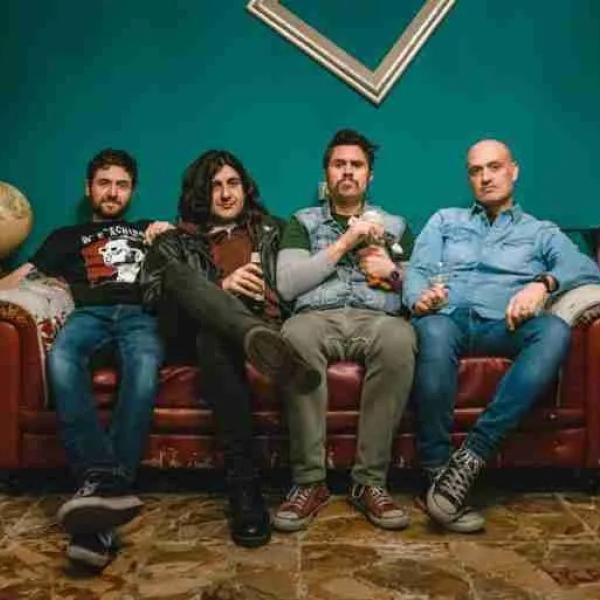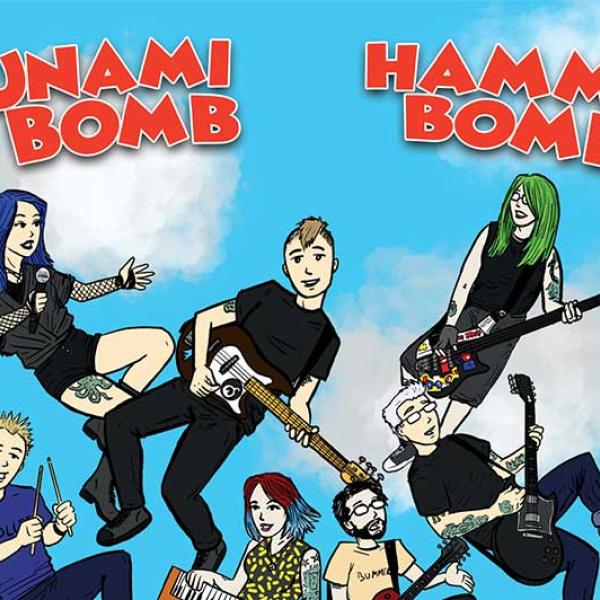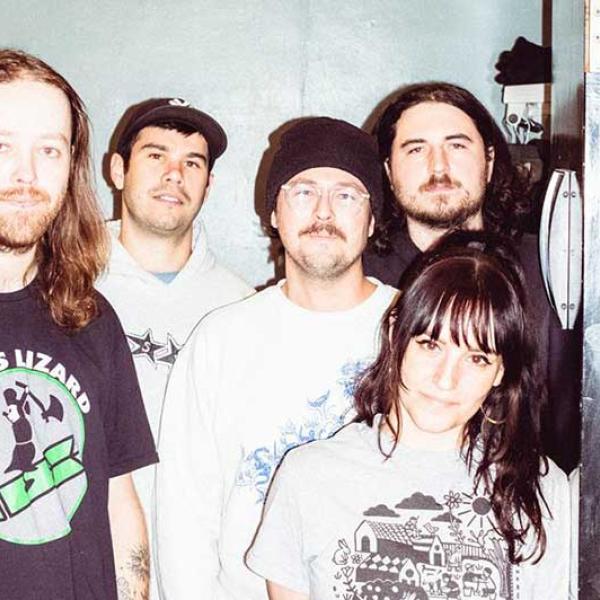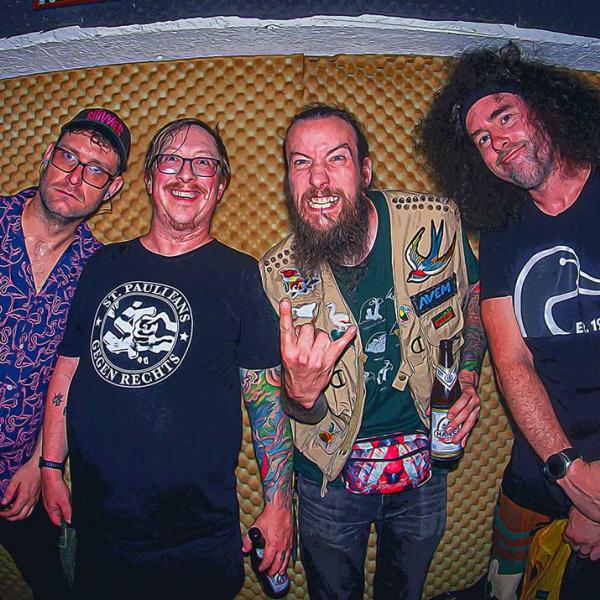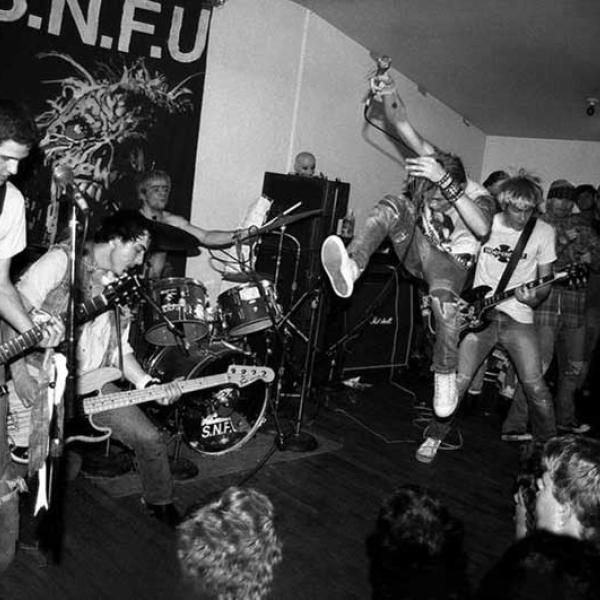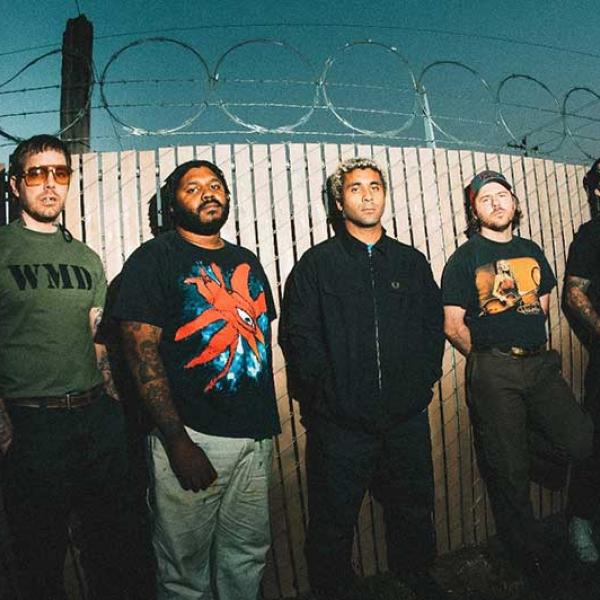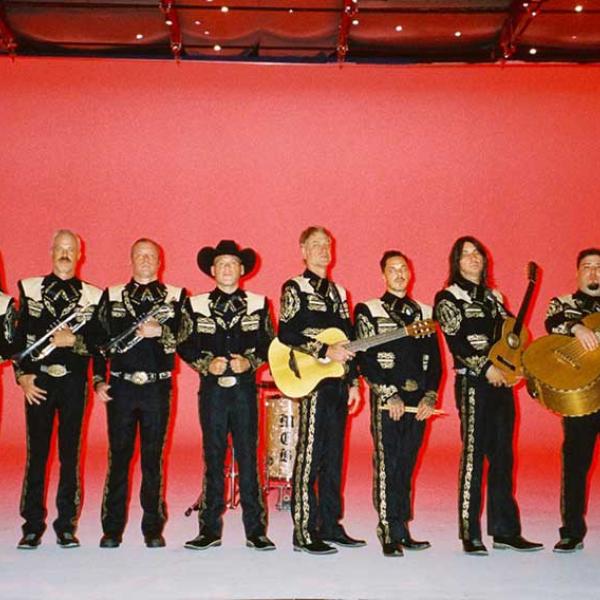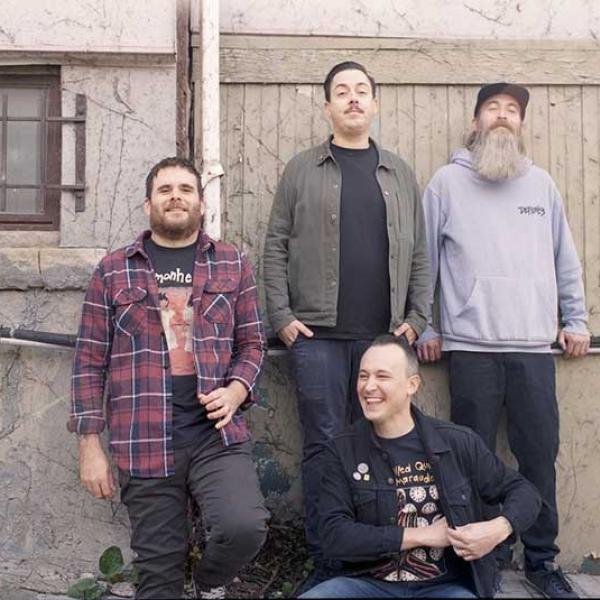Features
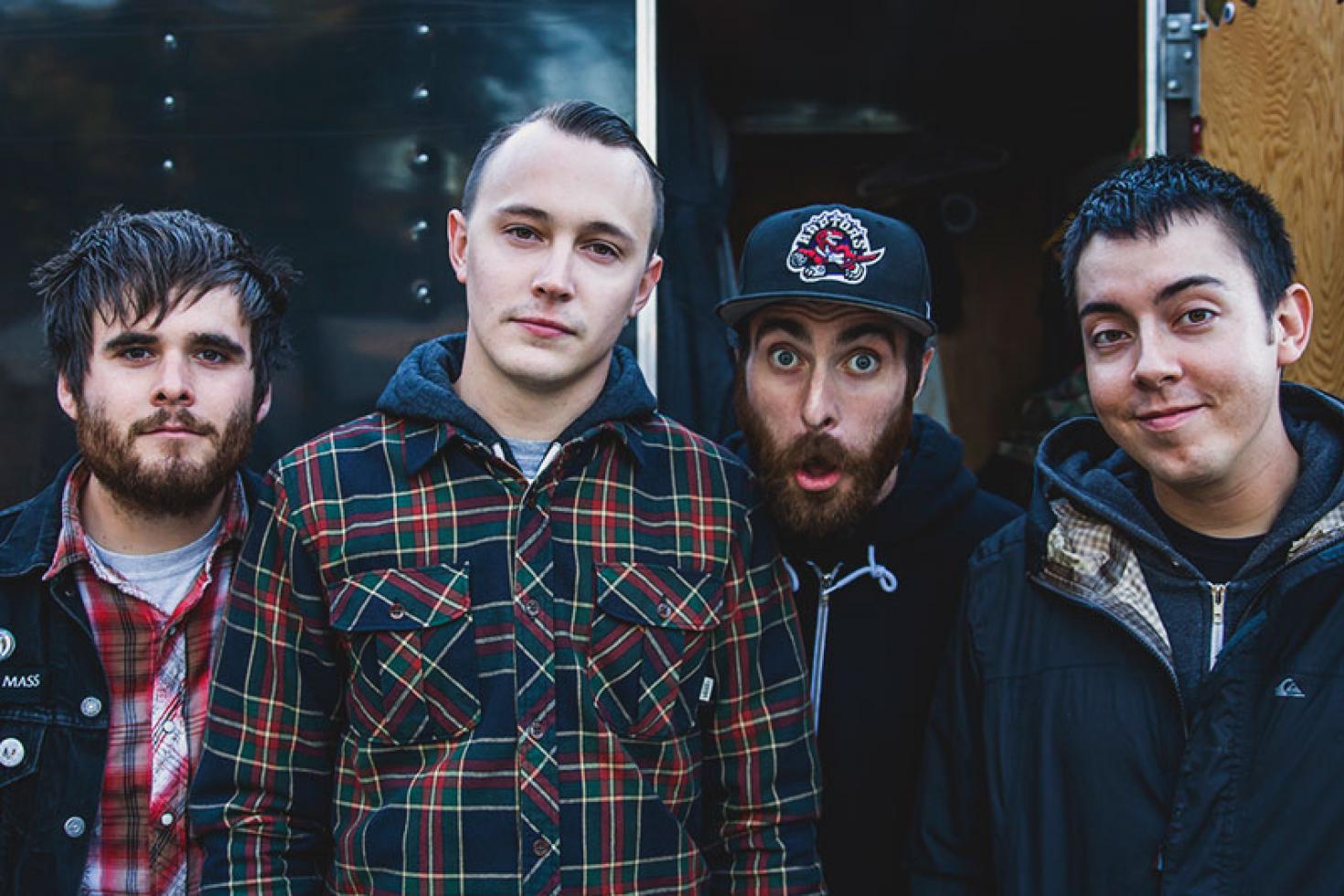
- by Christophe Vanheygen
We tried to hook up with The flatliners at Brakrock in Belgium and on Punk Rock Holiday in Slovenia. Both attempts failed miserably, but we finally caught up with the Canadian touring machine on the electronic highway. We sabotaged their van so they'd have time to answer a bunch of questions. Spoiler alert: The Flatliners will have a new record out next year. But oh, there's a lot more to read about, such as physically breaking down and being 75 in touring years ...
PRT: Having been around since about 2002. What’s been the best moment in band history?
Chris: It’s always been really difficult to pinpoint a pinnacle moment. I think at this point the guys and I are more into finding some longevity in what we do. But that doesn’t mean that we haven’t had lot of great moments, turning points, and whatnot. I think the fact that we’re still going 14 years deep as the same four guys that started jamming together in my parent’s basement is a pretty good moment though.
PRT: You started out as a ska punk band. What drew you to that oft-maligned genre?
Chris: When we were coming up in Southern Ontario, there was a nearby town called Newmarket where the scene was just thriving. It was mostly driven by the ska/punk genre, so a lot of the bands were drawing massive influence from bands like Operation Ivy, The Suicide Machines, all the Crack Rock Steady stuff (Choking Victim, Leftover Crack, INDK, Morning Glory, etc.) and all that. It spoke to us for some reason – probably because we were bored suburban kids with decent and relatively ‘safe’ upbringings, but the boredom always had us looking for trouble. We were already listening to bands like Operation Ivy and The Suicide Machines and all that, but mixed in with all the all the Fat Wreck and Epitaph stuff we learned about from my older brother and his skate video collection - Bad Religion, Rancid, NOFX, Green Day, etc. For some reason I think the four of us were always drawn more to the darker side of the ska/punk genre, more than your bright and happy run of third wave ska bands. And it solidified in us even more when we got to see these local bands play these shows in Newmarket writing their own versions of the dark side. We thought ‘we could do that too.’
PRT: Things certainly have changed since then. Now, personally I’ve never been big on ska, but do you sometimes miss playing it?
Chris: We still jam the old classics that got us into this world in the van on the road, and usually Toots & the Maytals, Junior Murvin and stuff like that. But as time goes on and you grow – especially as an artist, musician, and songwriter – you realize that half the battle if trying something new, even with just what kind of music you’ve yet to discover.
PRT: When did it sink in that you’d be doing this for a long time?
Chris: I think us signing to Fat served as a pretty good indication to the four of us that we’d at least gotten the attention of some people whose opinion carried some serious weight. Which at nineteen years old makes you feel pretty good! It started to sink in around that time, as we were being welcomed into this family of songwriters and record makers that had a lot to do with our upbringing on punk rock, that we could potentially do this for as long as we wanted if we played our cards right.
PRT: You managed to keep around the whole band going with the same members since the beginning. What’s the secret?
Chris: I mean, it’s not without its challenges and lines being blurred here and there, but you’ve just got to cut the bullshit at the end of the day. Being an artist of any kind comes with an ego – even if it’s an eventual thing that creeps up in you – but you’ve got to remember your roots and where you came from. When you look around the jam space room, the stage, the van, wherever, and it’s still you and your childhood friends digging in together and always pushing forward to find new ground to break with the music you’re writing together, it should only bring a smile to your face I think. In the end its music, its art, and its supposed to be an expression that you can share with others. So you might as well enjoy it and enjoy the company you keep rather than ruin the fun with some petty ego kind of bullshit.
PRT: It’s been a while since Dead Language … Tiresome question, but when can we expect a new record?
Chris: Our new album will come out in 2017 without a doubt. We’ve been hard at work on it. We like to take our time, and for the first time ever, we’ve been working on a record without having to spend 8-10 months of the year on the road at the same time. So I guess it’s safe to say we’ve really been taking our time with this one, ha!
PRT: Cavalcade has been widely acclaimed, but the mania was somewhat … cooler … on its follow-up, it seemed. Was there any degree of pressure to outdo that record?
Chris: Subconsciously, that pressure is bound to exist and almost always does. But you tend not to fully realize it unless it’s what you’re looking for. Instead it usually serves as a motivator more than anything else. By that I mean that every time we get together to write a song, an album, whatever, we want it to be the truest and best representation of us as musicians, of us as a band, in that moment. And in the moments of making Dead Language, we wanted to make a record that didn’t sound as polished as Cavalcade. I mean, all the bed-tracks for Dead Language were recorded live-off-the-floor, and most of the songs were done without a click-track. We’re a live band and wanted to make a record that would allow the songs to sound the same when we took them on the road. But it’s a slippery slope when you really go down a rabbit hole of your own band. I think it’s best to seize the moment rather than try to coldly calculate your art form.
PRT: 14 years, 5 full length records … Not the utmost prolific output. What’s your excuse?
Chris: We pride ourselves on not rushing anything we do with this band. We’ve hustled and struggled for our entire existence as a band, and while we can laugh it off, we do take our craft as songwriters very seriously and want to enjoy what we put out. You’re always your own toughest critic, and I think that’s why we typically write and record between 15-20 songs for each album. Maybe our biggest downfall so far as a band has been that we haven’t followed up any record in a timely matter. But I believe once you get on that tip you run the risk of rushing it. You can’t force this. You’ve gotta let it come out of you when it’s ready to come out of you.
PRT: Touring is exhausting. Have you at some point already realized that you might be “getting too old for this shit”? Examples?
Chris: Touring is a young person’s game, and as a 29-year-old guy that started touring when he was 17 years old, I’m like 75 in touring years. Your body will tell you when you’ve truly had enough, and I’m lucky to have not gotten there yet. But there are definitely nights when it’s hard for me to catch my breath after a show. That’s something I’ve struggled with for years though, just because we put a lot of energy into our show, and the beer doesn’t exactly help with mobility and agility. But I remember after one of two nights we did in Vancouver earlier this year, I couldn’t catch my breath, I was seeing stars and my body was shaking pretty bad. I dropped my guitar on stage after our last song, found a little spot just off the side of the stage and fell asleep. Right away. I must have slept there for 20 minutes before one of the guys found me to see if I was all right. I got up and felt fine, but sometimes your body just needs to shut it down.
PRT: In a more recent interview you talked about the mental and physical strain of touring and the risks it involves. Does it ever scare you?
Chris: It’s something I think about a lot these days. When you’re younger and you hit the road at 17 with your buddies, it is something that never ever crosses your mind. But when you’re doing the same circuit 12 years later and your life has changed, the lives of your friends and band-mates have changed, and you’ve all seen some shit and travelled the world together, you start to think of how many birthdays you’ve missed at home, how many cases of beer you’ve drank in your life, how much time you’ve spent in a hotel room, or how many more times you’ve been to this city you’re in tonight than you’ve spoken to your parents this year. And as a lyricist I’ve always been drawn to darker subjects. It’s really helped me get a lot of things off my chest so to speak, and without that outlet I don’t know what I’d do or how I’d be. But there’s a part of me that realizes now that I don’t really write lyrics when I’m happy. I need the tragedy, or the confrontation. So sometimes I think that I’m just waiting for something to go wrong so I can write about it, which isn’t exactly healthy. It becomes this vicious cycle of something bad happening, writing about it, and then singing it over and over again for months on the road and being constantly reminded of that thing that affected me. That’s the trippiest part I think. All of this information being put out there into the world is of my own volition, and that’s what I’ve decided to share. But I’m lucky to have great friends in this band, a great home life and a greatly supportive family. I’m extremely grateful for all of our fans everywhere, and to know that the lyrics I’ve shared with them may have helped them through some tough times in their lives makes me feel like I’ve accomplished something with our music.
PRT: Especially in the wake of Brandon Carlisle’s passing, as well as the numerous horror stories of crowd-funding and benefit gigs to pay for medical expenses, have you ever thought of 1) taking the best / most expensive insurance or 2) take it easy on the touring or 3) … anything else?
Chris: I think there’s a darkness that surrounds a lot of people who have chosen to spend their lives touring and whatnot. They’re out there trying to find where they belong. And each person is going to have their own way of justifying it, or preserving their innocence so to speak. It’s ironic that you spend all this time on the road to perform your music, and the actual performance takes up probably the least amount of your time in a given day. I just think that a lot of it comes down to that performance and remembering that’s why you’re there. Do all you can to make it count and do all you can to make sure your body and your mind are both capable.
PRT: When I was at Punk Rock Holiday, I hardly used my phone or internet. Now, imagine: you being on tour, and all social media, computers, smartphones and everything would disappear. Back to the good old days, writing letters and rotary dial phones … How would you feel about that?
Chris: People would probably look each other in the eye a lot more. That would be cool for human interaction. But even as a person who does enjoy the ease of communicating online, it’s definitely started to influence and mutate the ways we interact with eachother. Social fabrics have been severly altered to the point where when we’re faced with a face-to-face encounter, a lot of us don’t know what to do. Fuck it. Burn it all down and let’s start again.


